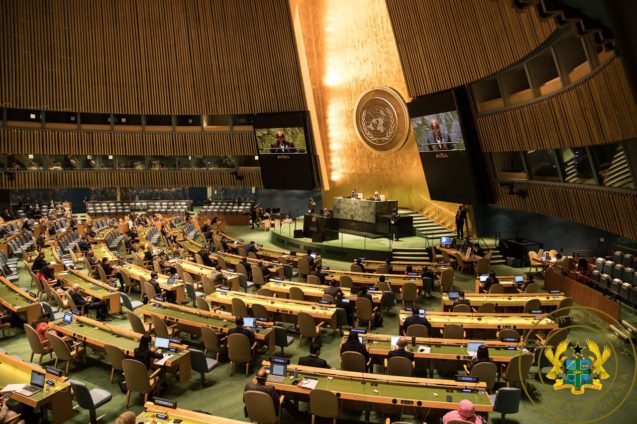“Admitting the African Union to an expanded G21 would have the same galvanising effect within Africa that the EU's participation in the G20 has within Europe, strengthening policy coordination and coherence across the 54 African economies.”
These were the words of the President of the Republic, Nana Addo Dankwa Akufo-Addo, on Wednesday, 22nd September 2021, when he took his turn to address the 76th Session of the United Nation’s General Assembly, in New York, in the United States of America.
According to President Akufo-Addo, “with the African Union at the table, the group suddenly would have representation for fifty-four (54) more countries, 1.3 billion more people, and $2.3 trillion more output. This extraordinary increase in representation will add just one seat to the table, and about ten minutes to the discussion.”
The President was, however, confident that it will redefine global policy coordination to enable a more prosperous, inclusive and sustainable world to emerge.
Reiterating the commitment of Africa in the fight against Climate Change, he maintained that “the fight is better-advanced if we are able to maintain the crucial balance between economic, political and environmental imperatives – positions that we will be articulating in Glasgow, at the COP 26 Conference, which should form part of the new Global Compact.”
Time for Africa Marshall Plan
The President stated that even before the pandemic outbreak, many had concluded that the current structure of global economic cooperation, designed some 77 years ago, has proven inadequate to finance infrastructure and economic transformation in developing countries.
According to him, “given the incapacity of the global financial system to produce the necessary outcomes to finance sustainable development, we need a constructive review.
"Covid-19 is a historic opportunity to rethink global economic co-operation, based on all economies of mutuality, equity, sustainability, and collective prosperity.”
COVID-19, the President said, has resulted in decreased revenues to the tune of some $150 billion, with African economies still reeling from the economic impacts of the pandemic.
“African governments have already spent scarce reserves fighting the pandemic and providing social protection to millions of affected households. Ghana has been advocating that innovative financing must also address structural challenges beyond responding to immediate fiscal needs, by providing mechanisms to facilitate investments in health infrastructure, technology, the environment, and people that would bolster resilience and equitable recovery,” he said.
President Akufo-Addo noted that the International Monetary Fund’s historic $650 billion SDR allocation should be seized upon as a catalytic effort to leapfrog Africa to the next level of human development, and ensure sustained global prosperity.
“African leaders have advocated for a prudent and transparent channelling of at least 25 to 35 per cent (25%-35%) of SDRs, that is $160 to 230 billion, from wealthier to vulnerable countries, $100 billion of which should be dedicated to Africa. We welcome the support of the European countries, represented at the Africa Summit in France, the IMF, the G7 and G20, to some SDR redistribution,” he stressed.
The President continued, “The IMF's historic $650 billion SDR allocation offers a unique opportunity to provide additional financial resources to address the vast and surging inequities the pandemic has laid bare, and a crisis to come. Africa’s allocation is some thirty-three billion dollars ($33 billion). If there was ever a time for an African Marshall Plan, it is now!”
The Marshall Plan, officially the European Recovery Program, ERP) was an American initiative passed in 1948 for foreign aid to Western Europe.
The United States transferred over $13 billion (the equivalent of about $114 billion in 2020) in economic recovery programmes to Western European economies after the end of World War II.
Proceeds of channelled SDRs, President Akufo-Addo reiterated, should fund vaccine acquisition and manufacturing, climate and green investments, and a pan-African Stability Mechanism like the European Stability Mechanism, that would safeguard financial stability on the Continent.
A part of the redistribution, he added, should also fund the recapitalisation of the African Development Bank and Afreximbank to support industrialisation, private-sector job creation and the African Continental Free Trade initiative.
Latest Stories
-
Shamima Muslim urges youth to lead Ghana’s renewal at 18Plus4NDC anniversary
27 minutes -
Akufo-Addo condemns post-election violence, blames NDC
34 minutes -
DAMC, Free Food Company, to distribute 10,000 packs of food to street kids
2 hours -
Kwame Boafo Akuffo: Court ruling on re-collation flawed
2 hours -
Samuel Yaw Adusei: The strategist behind NDC’s electoral security in Ashanti region
2 hours -
I’m confident posterity will judge my performance well – Akufo-Addo
2 hours -
Syria’s minorities seek security as country charts new future
3 hours -
Prof. Nana Aba Appiah Amfo re-appointed as Vice-Chancellor of the University of Ghana
3 hours -
German police probe market attack security and warnings
3 hours -
Grief and anger in Magdeburg after Christmas market attack
3 hours -
Baltasar Coin becomes first Ghanaian meme coin to hit DEX Screener at $100K market cap
4 hours -
EC blames re-collation of disputed results on widespread lawlessness by party supporters
4 hours -
Top 20 Ghanaian songs released in 2024
5 hours -
Beating Messi’s Inter Miami to MLS Cup feels amazing – Joseph Paintsil
5 hours -
NDC administration will reverse all ‘last-minute’ gov’t employee promotions – Asiedu Nketiah
5 hours

